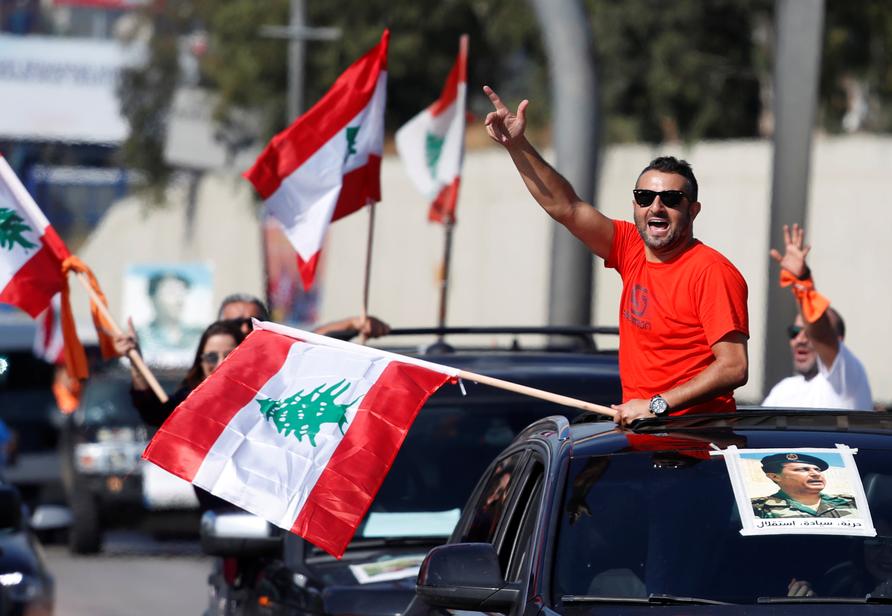
BEIRUT (Reuters) – A huge rally of support for Lebanon’s President Michel Aoun swarmed the country’s presidential palace on Sunday, a rebuke to broader protests that have demanded the wholesale ouster of the country’s elite and which have toppled the government.
Prime Minister Saad al-Hariri resigned on Tuesday following unprecedented nationwide protests, deepening a political crisis and complicating efforts to enact badly needed economic reforms.
A huge convoy of cars, some waving Aoun’s orange Free Patriotic Movement party flags and his portrait snaked across a main highway on Sunday while a sea of protesters marched to Baabda palace.
Though no immediate estimate of the rally’s size was available, many thousands spread across a roadway leading to the palace. It was the biggest counter protest to the wave of demonstrations that have gripped Lebanon since Oct. 17 and which have included Aoun’s removal among a set of sweeping demands.
“We’re here to say to Aoun that we love you and renew our trust in you,” said Hiyam Khairat at the rally.
In a televised speech, Aoun, who must now hold consultations with members of parliament to designate a new premier, said a three-point plan had been drawn up around tackling corruption, restoring the economy, and building a civil state.
“These three points are not easily achieved, we need your efforts, and we need a square filled both by you and the (anti-government) protesters to defend your rights.
“Many are trying to be obstructive. This is why we need to make a huge effort,” said Aoun.
He described corruption, a primary protestor grievance, as having become “nested” in the state.
Wearing a shirt emblazoned with Aoun’s face, George Barbar said he had driven from northern Lebanon to show his support: “If people don’t join hands with the president, there will be no Lebanon,” said Barbar.
Foreign Minister Gebran Bassil, Aoun’s son-in-law and an object of ridicule by anti-government protesters, addressed supporters at the rally, pledging to root out corruption and hold all who had taken state funds accountable.
“Be careful, we have long and difficult days ahead of us. We were racing against time to prevent a collapse but the corruption, squandering (of resources) and public debt beat us.”
BANKS REMAIN CALM
A semblance of normality returned to Lebanon this week, with roads re-opening and banks opening to customers on Friday after being shut for two weeks, though restrictions were reported on foreign currency withdrawals and transfers abroad.
The head of the country’s banking association said the banks did not see “any extraordinary movement” of money on Friday or Saturday. Analysts and bankers have feared a rush on deposits.
The central bank governor said the re-opening did not cause “any disturbance at any bank” and reiterated a pledge that “no formal capital controls are considered”.
Lebanon’s import-dependent economy has been hit by years of regional turmoil and a slowdown in capital flows that has put its foreign currency reserves under pressure.
Aoun has signaled support for a more technocratic government, saying in a speech after Hariri’s resignation that ministers should be chosen “according to their competencies and expertise, not political loyalties.”
Hariri’s government has continued in a caretaker capacity until a new one is formed.
Lebanon’s powerful Iran-backed Hezbollah movement, which backs Aoun, has said Hariri’s resignation will waste valuable time in enacting measures needed to tighten state finances and convince foreign donors to release some $11 billion in pledged aid.
The United Arab Emirates said on Sunday it was reviewing the possibility of an aid package and would inform Beirut of its assessment but did not yet have details of what it could entail.
Hariri said before the protests that the UAE had promised investments and financial aid to his deeply indebted country but that work remained to seal the deal.
The protests have been less intense since Hariri resigned, but demonstrators remain on the streets and a core demand is the rapid formation of a government led by technocrats to carry out the badly needed economic reforms.
Reporting by Alaa Kanaan, Eric Knecht and Laila Bassam; editing by David Evans
Image: A supporter of Lebanon’s President Michel Aoun gestures during a rally in Baabda near Beirut, Lebanon, November 3, 2019. REUTERS/Goran Tomasevic



